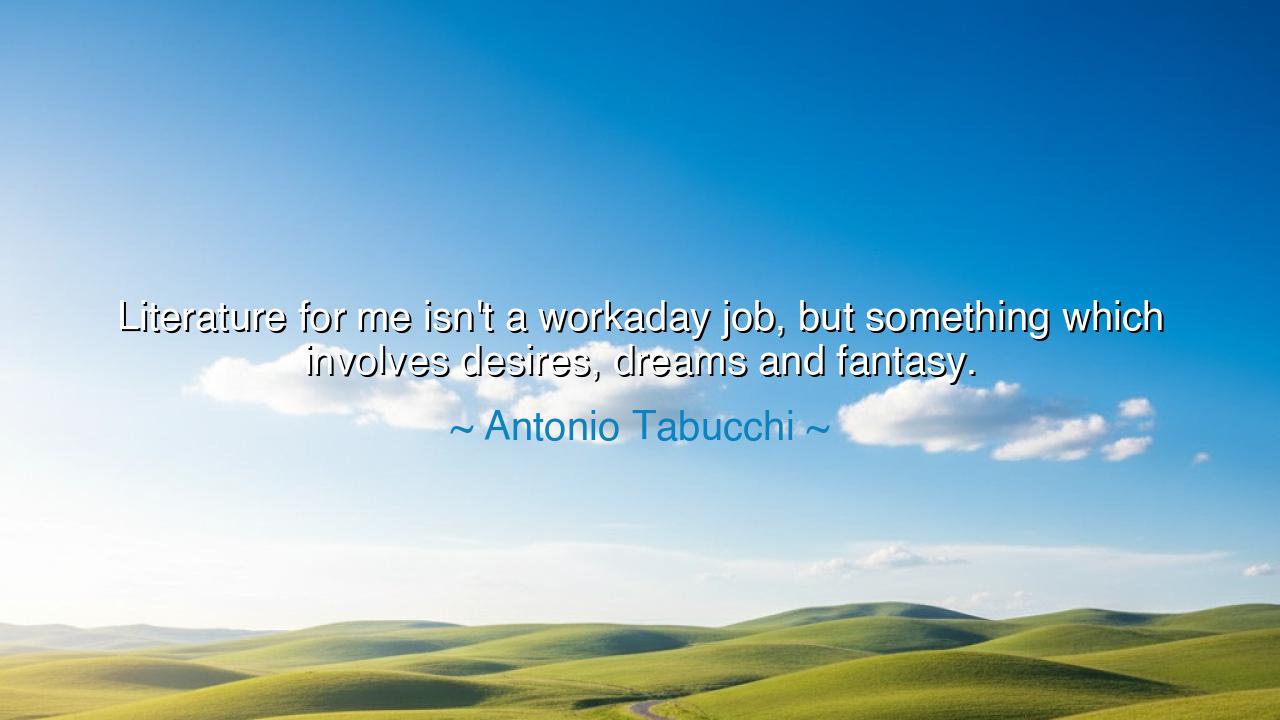
Literature for me isn't a workaday job, but something which
Literature for me isn't a workaday job, but something which involves desires, dreams and fantasy.






“Literature for me isn't a workaday job, but something which involves desires, dreams and fantasy.” Thus spoke Antonio Tabucchi, the Italian master of letters, who saw writing not as mere labor, but as an act of soulcraft—a sacred mingling of passion, imagination, and longing. His words are a gentle rebuke to the modern world, where art is too often measured in profit, deadlines, and acclaim. To Tabucchi, literature is no trade of ink and paper; it is the mirror of the inner world, the place where our hidden desires breathe, our forgotten dreams awaken, and our fantasy dares to speak truth in the language of myth.
In this declaration lies a profound understanding of what it means to create. The workaday job belongs to the realm of repetition and necessity—the rhythm of survival. But literature, as Tabucchi reveals, is an act of transcendence. It springs not from the hands but from the heart. It is not produced by duty, but born of yearning. To write is to open a door between the seen and the unseen, to translate emotion into word, to give voice to what the waking world often silences. It is, as the ancients would say, the work of the daemon, that divine whisper that lives between humanity and the gods.
The origin of Tabucchi’s sentiment can be traced to the long lineage of writers who viewed the pen not as a tool, but as a wand. Homer, when he sang of the wrath of Achilles and the voyages of Odysseus, did not merely record events—he dreamed them into eternity. His verses were born from a sacred communion with imagination, where gods and men shared the same stage. Later, Dante Alighieri, wandering through the inferno of his own mind, turned personal loss and political exile into a vision of cosmic order. Such men did not write for coin or comfort; they wrote because they could not live otherwise. Their desires and dreams were too vast for silence.
Tabucchi, like these ancients, understood that fantasy is not escape—it is revelation. To dream upon the page is to glimpse truth beyond the surface of life. Fantasy is the bridge between what is and what might be; it transforms sorrow into story and longing into beauty. Through it, the writer becomes a traveler between worlds, shaping reality through vision. For what is civilization itself but the residue of dreams once dared? Every great act—of art, of faith, of discovery—begins as a flicker in the imagination of one who refuses to accept the limits of the ordinary.
Yet, Tabucchi’s words also hold a quiet defiance against those who would make art mechanical. In an age that demands constant productivity, he reminds us that creation cannot be forced. The soul must be allowed to wander, to drift, to feel. Desires must ferment, dreams must deepen, fantasies must unfold in their own rhythm. To treat literature as labor alone is to drain it of its mystery. True art does not come when we command it, but when we surrender to it. As the poet Rilke once said, “You must give birth to your images; they are the future waiting to be born.”
Consider the story of Franz Kafka, a man whose days were spent in the gray corridors of a bureaucratic office, but whose nights burned with the light of creation. Though his life seemed ordinary, his imagination gave birth to extraordinary visions—the trial without justice, the man turned insect, the universe indifferent yet hauntingly human. His dreams and desires were the only realm where he could be truly free. And so his “fantasy,” born from loneliness and longing, became the language of the modern condition. Through him we learn that even in despair, imagination is salvation.
So, my children of the written word, take this lesson from Tabucchi’s wisdom: guard your dreams as sacred, and let your desires guide your craft. Write not for recognition, but for revelation. Do not treat art as labor, but as a pilgrimage of the soul. Read deeply, feel deeply, dream without apology. For in every act of creation, no matter how small, you participate in the eternal dance between reality and imagination, between the human and the divine. And when you do so, you will find that your work—whether word, song, or vision—ceases to be a mere job, and becomes instead the echo of eternity itself.






AAdministratorAdministrator
Welcome, honored guests. Please leave a comment, we will respond soon